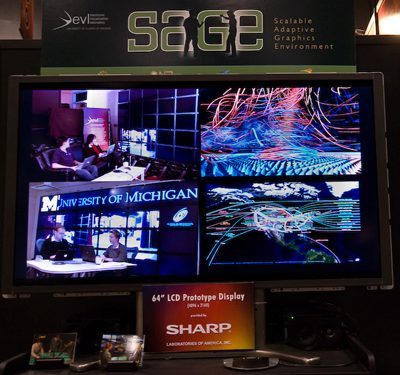SC08 Bandwidth Challenge (BWC) Showcases Global Visualcasting
November 6th, 2008
Categories: Applications, Industry, Networking, Software, Supercomputing, Tele-Immersion, User Groups, Visualization

About
Review this press release at HPCWire
See EVL’s SC08 BWC collaborator, Australia’s Academic and Research Network (AARNet) press release
November 6, 2008
SC08 Bandwidth Challenge Showcases Global Visualcasting - Collaboration in Ultra-Resolution Work Environments
CHICAGO - Among this year’s Bandwidth Challenge finalists at Supercomputing 2008 (SC08) is a globally distributed, multi-site collaborative experiment to stream high-resolution content over high-speed networks.
University of Illinois at Chicago’s (UIC) Electronic Visualization Laboratory (EVL), along with partner Sharp Laboratories of America, is streaming 4K and Full High-Definition (HD) video, audio and visualizations among three booths on the SC08 show floor in Austin, two Midwestern universities, and several research institutes in Korea, Japan, Australia, Russia and the Czech Republic, to create a sustained global teleconference.
The participating partners already have persistent collaboration spaces in place, consisting of network-connected tiled display walls and common middleware. This cyberinfrastructure is enabling researchers to tackle 21st-century problems - ranging from the origin of the universe to global climate change - by accessing and sharing one or more high-resolution images and animations as well as conducting HD video teleconferences with collaborators worldwide.
The enabling technology is EVL’s Scalable Adaptive Graphics Environment (SAGE), middleware for streaming ultra-resolution visualizations, multi-channel audio, laptop content, and HD video camera feeds, from one or more sources, over multi-gigabit networks to a tiled display. SAGE Visualcasting is an applications-driven technique to enable distance collaboration by simultaneously replicating and sending multiple visual and audio streams to multiple, variable-sized tiled displays.
The SC Bandwidth Challenge, a major annual forum for showcasing leading-edge, international, networked applications, is a friendly yet spirited competition. Finalists compete from the SC show floor during a scheduled hour-long slot, and the winning application gets bragging rights for a year.
As one of this year’s finalists, EVL and its collaborators will initiate the Global Visualcasting experiment in the San Diego Supercomputer Center booth, where EVL is again participating with its partners from University of California, San Diego. EVL will send gigabit streams of data to SARA in the Dutch Research booth and to KISTI in the KISTI Supercomputing Center booth on the show floor, University of Michigan and UIC. Up to five additional participants will join at will, including Masaryk University in the Czech Republic, KISTI/GIST in Korea, University of Queensland in Australia, Osaka University in Japan, and the Space Research Institute in Russia. All are members of the OptIPlanet Collaboratory, a group of 36 sites around the world committed to building a persistent networked visualization and collaboration environment based on tools and techniques developed during the National Science Foundation-funded OptIPuter project.
The Bandwidth Challenge session will be visualized on Sharp’s new 4K (4096x2160) 64-inch LCD display prototype, a single panel four times the resolution of HDTV. Given researchers are already building ultra-high-resolution tiled displays for the office to deal with the scale and complexity of today’s data, Sharp sees a market for 4K or higher-resolution display and display systems in the research laboratory of the future.
The networks supporting this challenge include CiscoWave, Pacific Wave, National LambdaRail, Michigan LambdaRail, CESNET, TransLight / StarLight, GLORIAD-Russia, KREONet2, AARNet and JGN2plus.
About Electronic Visualization Laboratory, University of Illinois at Chicago
The Electronic Visualization Laboratory (EVL) at University of Illinois at Chicago (UIC) is a graduate research laboratory specializing in the research and development of networked, high-resolution visualization, collaboration and virtual-reality display hardware and software systems, and the design and implementation of international networking infrastructure. It is a joint effort of UIC’s College of Engineering and School of Art and Design, and represents the oldest formal collaboration between engineering and art in the country offering graduate MS, PhD and MFA degrees. EVL has received worldwide recognition for developing the original CAVE™ and ImmersaDesk™ virtual reality systems, and, more recently, the GeoWall, the 105-Megapixel LambdaVision tiled display and the Varrier autostereoscopic display. EVL is a founding member of StarLight and the Global Lambda Integrated Facility (GLIF), and was a lead institution of the NSF-funded OptIPuter project. OptIPlanet Collaboratory Institutions.
About SAGE: Scalable Adaptive Graphics Environment
SAGE is middleware for streaming and managing ultra-high-resolution visualizations and high-definition (HD) video on scalable tiled displays. SAGE uses distributed rendering clusters connected by gigabit networks to support on-demand, real-time collaborative work sessions. SAGE’s Visualcasting service enables multi-point collaboration, whereby the visualizations and HD video streams are replicated and sent to multiple sites to enable researchers to simultaneously communicate with each other and share high-resolution visualizations. Visualcasting is application-centric, enabling researchers to dynamically connect to one or more sites for collaborative sessions; this is an important advancement over traditional network multicasting, which is not automatically supported by today’s networking infrastructure and requires network engineering to implement.
About Sharp Laboratories of America Inc.
Sharp Laboratories of America is the U.S. based research and development laboratory for Sharp Corporation, Japan. Sharp Labs is focused on performing fundamental and applied research that results in new technologies and innovations.